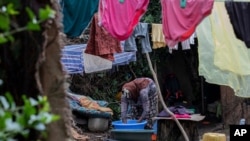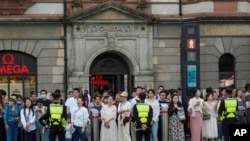ບັນດາເຈົ້າໜ້າທີ່ອົງການສະຫະປະຊາຊາດ ກ່າວວ່າ ລັດຖະບານທັງຫຼາຍທີ່ສະໜອງການຮັກສາສຸກຂະພາບແກ່ປະຊາຊົນຂອງພວກເຂົາເຈົ້າແລະປົກປ້ອງສັງ ຄົມໂດຍສະເພາະສຳລັບພວກທີ່ມີຄວາມສ່ຽງສູງ ຈະສາມາດຮັບມືກັບຜົນກະທົບຮ້າຍແຮງຂອງໂຣກລະບາດໄວຣັສໂຄໂຣນາ ໄດ້. ບັນດາເຈົ້າໜ້າທີ່ດັ່ງກ່າວເຂົ້າ ຮ່ວມໃນການອະພິປາຍກ່ຽວກັບຜົນກະທົບຈາກການລະບາດຂອງໄວຣັສໂຄວິດ-19 ແລະກ່ຽວກັບສິດທິມະນຸດ ຢູ່ສະພາສິດທິມະນຸດຂອງສະຫະປະຊາຊາດ ລີຊາ ສະໄລນ໌ ລາຍງານມາໃຫ້ວີໂອເອ ຈາກນະຄອນເຈນີວາ ຊຶ່ງໄຊຈະເລີນສຸກ ຈະນຳລາຍລະອຽດມາສະເໜີທ່ານໃນອັນດັບຕໍ່ໄປ.
ບໍ່ມີປະເທດໃດທີ່ໄດ້ຖືກລະເວັ້ນຈາກການກະທົບຂອງໂຣກລະບາດໄວຣັສໂຄໂຣນາ. ແຕ່ດັ່ງດຽວກັນກັບກໍລະນີໄພພິບັດອື່ນໆ ບັນດາເຈົ້າໜ້າທີ່ອົງການສະຫະປະຊາຊາດ ກ່າວວ່າ ມັນເປັນພວກຄົນທີ່ທຸກຍາກທີ່ສຸດ ພວກທີ່ຫຼໍ່ແຫຼມທີ່ສຸດ ແລະພວກສະມາຊິກທີ່ບໍ່ໄດ້ຮັບຄວາມສຳຄັນຂອງສັງຄົມ ເປັນຜູ້ທີ່ໄດ້ຮັບຜົນກະທົບໜັກທີ່ສຸດ ຈາກການລະບາດຂອງໄວຣັສ COVID-19.
ຂ້າຫຼວງໃຫຍ່ເພື່ອສິດທິມະນຸດ ຂອງສະຫະປະຊາຊາດ ທ່ານນາງມິແຊລ ບາເຊີເລັດ ກ່າວວ່າ ບາງປະເທດໄດ້ຮັບມືກັບວິກິດການນີ້ ໂດຍຈັດຕັ້ງປະຕິບັດນະໂຍບາຍຕ່າງໆບົນພື້ນຖານຂອງສິດທິມະນິດ. ທ່ານນາງກ່າວວ່າ ພວກປະເທດທີ່ໄດ້ປະກາດໃຊ້ນະໂຍບາຍຕ່າງໆ ເຊັ່ນວ່າ ການເຂົ້າເຖິງການຮັກສາສຸກຂະພາບສຳລັບພວກຄົນ ຜູ້ທີ່ບໍ່ສາມາດຈ່າຍໄດ້ ແລະໃຫ້ເງິນຊ່ອຍເຫຼືອລ້າ ໃຫ້ອາຫານສຸກເສີນ ແລະການຊ່ອຍເຫຼືອທີ່ຈຳເປັນແກ່ພວກຄົນ ຜູ້ທີ່ໄດ້ສູນເສຍວຽກງານຂອງພວກເຂົາ ເພື່ອໃຫ້ສາມາດຢູ່ລອດພົ້ນໄພພິບັດນີ້ໄປໄດ້.
ແຕ່ໃນອີກດ້ານນຶ່ງທ່ານນາງເຕືອນປະເທດທັງຫຼາຍບໍ່ເອົາຫົວຊານຳຄວາມຕ້ອງ ການຂອງບັນດາສະມາຊິກທີ່ອ່ອນແອທີ່ສຸດຂອງສັງຄົມແລ້ວ ກໍຈະປະເຊີນກັບອະນາຄົດທີ່ມົວໝອງກວ່າເກົ່າ.
ທ່ານນາງບາເຊີເລັດ ເວົ້າວ່າ “ມາເຖິງມື້ນີ້ ບາງປະເທດໄດ້ສະແດງໃຫ້ເຫັນເຖິງຄວາມບໍ່ໄວ້ເນື້ອເຊື້ອໃຈປະຊາຊົນຂອງພວກເຂົາເຈົ້າ--ກີດກັນການວິພາກວິຈານ ຈຳກັດເສລີພາບຂອງຂໍ້ມູນ ແລະປາບປາມຢູ່ສະຖານທີ່ໂຮມຊຸມນຸມ ຂອງພົນລະ ເມືອງ. ສິ່ງຕ່າງໆເຫຼົ່ານັ້ນ ແລະການລະເມີດສິດທິມະນຸດອື່ນໆໄດ້ບ່ອນທຳລາຍດ້ານສາທາລະນະສຸກ ພ້ອມດ້ວຍສິດທິມະນຸດແລະຄວາມຄາດຫວັງໃນການຟື້ນ ຕົວທີ່ເຂັ້ມແຂງ ແລະຍືນຍົງ.”
ມາດຕະການປິດເມືອງແນໃສ່ເພື່ອຫລຸດຜ່ອນການແຜ່ລະບາດຂອງໄວຣັສໂຄໂຣນາ ໄດ້ສ້າງຄວາມເສຍຫາຍຕໍ່ເສດຖະກິດຂອງຫຼາຍໆປະເທດ. ປະເທດເຫຼົ່ານີ້ ໄດ້ຮັບຜົນກະທົບທີ່ໜັກໜ່ວງ ໂດຍສະເພາະຕໍ່ພວກຄົນທຸກຍາກ ແລະຕໍ່ປະຊາ ຊົນຫຼາຍກວ່າ 2 ພັນລ້ານຄົນທີ່ເຮັດວຽກໃນຂະແໜງການນອກລະບົບ.
ອົງການແຮງງານສາກົນ ລາຍງານວ່າ ພວກແມ່ຍິງໄດ້ຮັບຜົນກະທົບຫຼາຍຢ່າງບໍ່ສົມສ່ວນໃນດ້ານຂອງການສູນເສຍວຽກງານ ແລະການຕັດເວລາລົງ ຍ້ອນໂຣກລະບາດ. ອົງການນີ້ ກ່າວວ່າ ຄົນອື່ນໆຜູ້ທີ່ຖືກກະທົບໂດຍກົງ ຈາກວິກິດການດ້ານເສດຖະກິດ ແລະການຈ້າງງານທີ່ກຳລັງເປີດເຜີຍອອກມານີ້ ລວມທັງພວກຄົນງານຕ່າງດ້າວ ພວກຄົນພື້ນເມືອງ ພວກຊົນກຸ່ມນ້ອຍຕ່າງໆ ແລະພວກຄົນພິການ ເປັນຕົ້ນ. ອົງການນີ້ ກ່າວອີກວ່າ ລະບົບການປົກປ້ອງສັງຄົມແມ່ນເປັນ ອົງປະກອບທີ່ສຳຄັນ ໃນການຟື້ນຕົວຈາກການລະບາດຂອງໄວຣັສ COVID-19.
ອົງການອະນາໄມໂລກ ຫຼື WHO ລາຍງານວ່າ ຈໍານວນກໍລະນີຕິດເຊື້ອໄວຣັສໂຄໂຣນາ ໃນທົ່ວໂລກ ຈະສູງຂຶ້ນເຖິງ 29 ລ້ານຄົນ ໃນໄວໆນີ້ ລວມທັງການເສຍຊີວິດ ເກືອບຮອດ 1 ລ້ານລາຍ.
ຜູ້ບໍລິຫານໂຄງການສຸກເສີນດ້ານສຸກຂະພາບ ທ່ານໄມໂກລ ຣາຍແອນ ໃຫ້ຂໍ້ສັງເກດວ່າ ສຸຂະພາບມະນຸດ ແລະສິດທິມະນຸດ ແມ່ນເຊື່ອມໂຍງກັນໂດຍທຳມະຊາດ. ແລະເຖິງຢ່າງໃດກໍຕາມ ທ່ານກ່າວວ່າ ການເຂົ້າເຖິງການຮັກສາສຸ ຂະພາບ ໃນຍາມການລະບາດຂອງໄວຣັສໂຄໂຣນາ ກໍບໍ່ມີຄວາມເປັນທຳເລີຍ.
ທ່ານຣາຍແອນ ເວົ້າວ່າ “ມັນໄດ້ຮັບອິດທິພົນໂດຍເພດ ໂດຍຄວາມຮັ່ງມີ ໂດຍອາຍຸ ໂດຍຊົນຊັ້ນ ໂດຍຖານະທາງກົດໝາຍ ໂດຍຊົນເຜົ່າ ແລະໂດຍສິ່ງອື່ນໆຫຼາຍຢ່າງ…ອົງການ WHO ສະໜັບສະໜຸນ ສໍານັກງານຂ້າຫຼວງໃຫຍ່ເພື່ອສິດ ທິມະນຸດຂອງສະຫະປະຊາຊາດ ຫຼື OHCHR ໄດ້ເຕືອນຢູ່ເລື້ອຍວ່າ ໂຣກລະ ບາດໄວຣັສ COVID-19 ບໍ່ຄວນຖືກໃຊ້ເປັນຂໍ້ອ້າງ ເພື່ອຄວບຄຸມເສລີພາບຂັ້ນພື້ນຖານ.”
ທ່ານຣາຍແອນ ກ່າວອີກວ່າ ປະຊາຄົມນານາຊາດ ຕ້ອງຮ່ວມມືກັນເພື່ອພັດທະ ນາຢາວັກຊີນ ທີ່ປອດໄພ ແລະມີປະສິດທິພາບ ແລະຮັກສາປິ່ນປົວພະຍາດໄວຣັສ COVID-19. ທ່ານກ່າວຕໍ່ວ່າ ການເຂົ້າຫາສິນຄ້າທີ່ຊ່ອຍຮັກສາຊີວິດ ຕ້ອງໄດ້ຖືກແບ່ງປັນ ແລະແຈກຍາຍຢ່າງວ່ອງໄວ ແລະໃຫ້ທັງຄົນຮັ່ງມີ ແລະຄົນທຸກ ເທົ່າທຽມກັນ. ທ່ານກ່າວຕື່ມວ່າ ການມີພຽບພ້ອມຂອງຢາວັກຊີນ ບໍ່ຄວນຂຶ້ນຢູ່ກັບຄວາມສາມາດ ທີ່ຈະໃຊ້ຈ່າຍສຳລັບພວກມັນ.
ອ່ານຂ່າວນີ້ຕື່ມ ເປັນພາສາອັງກິດ
U.N. officials say governments that provide healthcare and social protections to their people, especially to the most vulnerable will be better able to cushion the shock of the devastating coronavirus pandemic. The officials participated in a debate on the impact of the COVID-19 pandemic on human rights at the U.N. Human Rights Council.
No country has been spared the blows of this global pandemic. But, as is the case with other disasters, UN officials say it is the poorest, most vulnerable and marginalized members of society who suffer most from the impact of COVID-19.
UN High Commissioner for Human Rights Michelle Bachelet says some states have responded to this crisis by implementing human rights-based policies. She says States that have enacted policies such as access to healthcare to those who cannot afford it and providing cash grants, emergency food and other essential aid to those who have lost their jobs are better able to weather this calamity.
On the other hand, she warns nations that ignore the needs of the weakest members of society will face a grimmer future.
“To date, some States have demonstrated deep mistrust of their people — repressing criticism, limiting freedom of information and cracking down on the civic space. These and other human rights violations have undermined public health, as well as human rights and the prospect of a strong and sustainable recovery,” said Bachelet.
Lockdown measures aimed at curbing the spread of the coronavirus have devastated the economies of many countries. They have had a particularly harsh impact on the poor and on the more than two billion people working in the informal sector.
The International Labor Organization reports women are disproportionately impacted by the pandemic in terms of job losses and decrease in hours. It says others who bear the brunt of this unfolding economic and employment crisis include migrant workers, indigenous peoples, ethnic minorities and people with disabilities. It says social protection systems are a key element in recovery from COVID-19.
The World Health Organization reports the number of coronavirus cases globally will soon top 29 million, including nearly one million deaths.
Executive Director of WHO Health Emergencies Program, Michael Ryan notes human health and human rights are intrinsically linked. And, yet, he says access to health care in the time of coronavirus has not been fair.
“It has been influenced by gender, by wealth, by age, by social class, by legal status, by ethnicity and by so many other things… WHO supports OHCHR ‘s [Office of the High Commissioner for Human Rights] consistent warnings that the COVID-19 pandemic should not be used as an excuse to clamp down on fundamental freedoms,” he said.
Ryan says the international community must work together to develop safe and effective vaccines and therapeutics for COVID-19. He says access to these life-saving products must be shared and distributed rapidly and equitably to rich and poor alike. He says their availability should not be based on the ability to pay for them.










